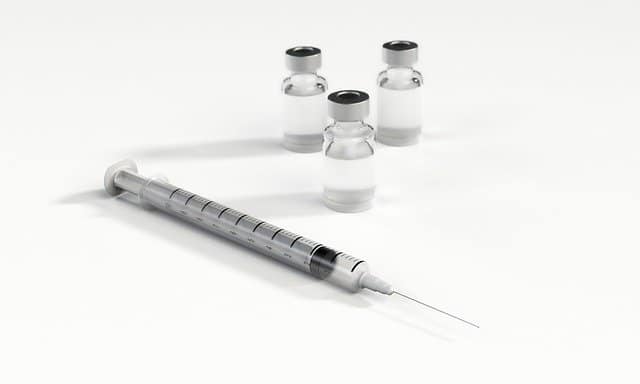
I was super excited to hear about the Covid vaccination, and grateful to the scientific minds that have worked to create it so quickly. And then utterly distraught when I discovered that for humanity to develop herd immunity, at least 55% of the population must be vaccinated, and currently only 54% of 4000 respondents said they would definitely roll up their sleeves.
Worse still, that figure dropped by 6.47% when the respondents were shown misinformation online. You know the sort of thing. The vaccine will turn you into Bigfoot, a lawnmower, purple mushed up goo fit only for feeding lizards.
The Labour party have proposed that social media firms who don’t remove false scare stories about vaccines should be fined. I think that’s a terrible idea. Banning people from saying stuff doesn’t stop them saying stuff. They just say the stuff more quietly and get ever more convinced what they’re saying must be important, for it to warrant legislation to stop them saying it. But the anti-vaxxers’ argument isn’t important, it’s wrong. Completely different. The answer isn’t to ban the anti-vaxxers but to explain why they are mistaken on every available platform, which is why I’m writing this when I could be staring at telly.
Do you really think the toffs that allegedly run this country are capable of a conspiracy to cull the population? They couldn’t run a bun fight in a bakery. Why would they spend a heap of cash ordering vaccines to kill and maim us, when Covid is doing such a splendid job gratis?
There are 223 vaccinations against the bug currently in development. Of these, 39 have got through the first phase of safety trials, which checks whether it’s safe, rather than effective; 18 have made it through phase two, which involves it being tested on a much bigger sample of volunteers; 11 have got through phase three, which is where the vaccine is tested to see if it actually works – thousands of volunteers are randomly assigned the vaccine or a placebo, and then measured to see if significantly fewer of them develop Covid, which is obviously another safety trial as well as a test of the vaccine’s efficacy.
Of these eleven, the Pfizer product is showing extremely promising results, proving to be about 90% effective. It still needs to be peer reviewed, and various health authorities need to approve it, but it’s really starting to look hopeful that next year needn’t be as boring and wretched as this one.
Pfizer’s breakthrough is an unprecedented triumph, equivalent to the invention of the wheel, the internet, space travel. Usually vaccines take 5-10 years to develop, but in this instance the world’s most brilliant virologists have co operated, shared information and studies, and had billions and billions of dollars thrown at them by private investors, investment funds and governments. They have committed to this research because Covid has stopped the world, wiped billions off the stock market, stretched national health services to their limit and beyond. Pandemics are bad news for everyone. They are an equal opportunity nightmare. It is in everyone’s interests to kick their skanky little tushes.
Now it’s true that Covid isn’t the scariest, deadliest disease going. If I get it I’ll almost certainly be fine. But I know plenty of people who won’t be, and I bet you do too. Like my mum, who has an auto-immune disease and has barely left her house all year, or my mate Bill, who’s having cancer treatment. Anyway, however low the risk of Covid is to you personally, the risk of the vaccine is considerably lower. It’s true too that there have been instances historically of medicines being approved prematurely. But there have been instances of cars, planes, boats being sold with deadly faults, fridges that catch fire, cosmetics containing carcinogens. Yet we continue to drive and wear make up and use white goods because we understand that faults are corrected, manufacturers learn from their mistakes, go on to produce ever better, safer products, which are put through yet more rigorous tests.
Vaccines prevent three million deaths worldwide each year. They have resulted in the near total eradication of smallpox, polio and tetanus, while measles and diphtheria have been reduced by 99.9%. And yet the World Health Organisation lists hesitancy to take up vaccines as one of the top ten biggest threats to global health.
Vaccine distrust is reflective of government distrust. It exists predominantly in developed nations – in less economically advantaged parts of the world, they tend to be of the opinion that dying painfully and prematurely is better avoided. But here in the West we’ve seen a marked and intriguing phenomenon: the greater the levels of social inequality in a country, the higher the prevalence of anti-vaxxers.
It makes a sort of sense I guess. When I conducted a totally unscientific, unrepresentative poll among my Facebook friends, I heard: “Why would we trust them? Look what happened at Grenfell” and “have you seen how much money Pfizer are earning out of this?” The Greek chorus of the last forty or so years (in addition to forever, obviously, but particularly since Thatcher) has been rich people shafting poor people; profiting from their labour, misery, hunger, ambition. Vaccine distrust is not so much a sickness as a symptom: a symptom of a much wider, longstanding social problem, that of the ever growing chasm between the haves and have nots.
Our politicians and public servants should be mortified and broken with shame on discovering that a huge proportion of its citizens genuinely believe them capable of mass murder, if mass murder means profit. They should vow to restore public trust and confidence by any necessary means.
But they won’t. And so 2021 threatens to be as boring and wretched as 2020.

